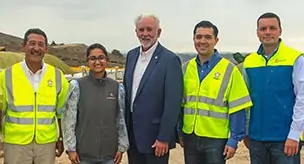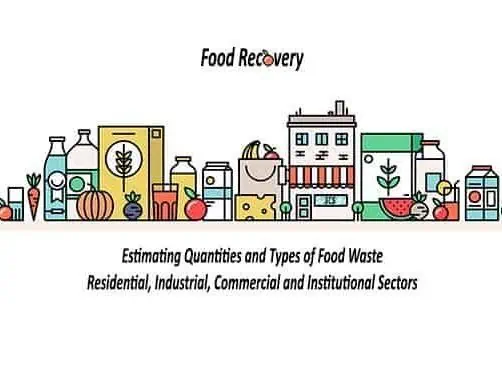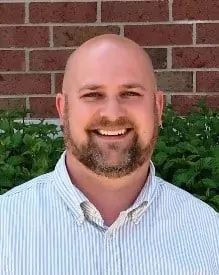

In October, Republic Services’ Otay Compost Facility at the Chula Vista, California, Otay Landfill opened for business. The compost facility helps communities in San Diego County meet the requirements of California’s SB1383 law mandating the diversion of organic waste from landfills.
The composting facility designed by SCS Engineers in collaboration with Sustainable Generation operates completely off the grid using solar energy. It is the first fully solar-powered compost facility in the state and can process 100 tons of organics per day, with plans to double capacity by year-end.
Both organics recycling and reuse leaders, Republic Services hired SCS Engineers to design the Otay Compost Facility. The design uses renewable energy to run 100 percent of the composting operations at the site. The facility design includes using technologies to speed the maturation rates and reduce excessive odors. Blowers to aerate the organic material, oxygen and temperature sensors, and advanced compost cover technology produce a high-quality product.

“Republic’s taken the goals of SB 1383, to reduce emissions of short-lived climate pollutants further. They’re running a sustainable facility that enables residents, businesses, and government to easily reuse and recycle more within a smaller carbon footprint than ever expected,” says Vidhya Viswanathan, engineer and project director.
As California collects and recycles organic materials from homes and businesses, local governments will use the products made from recycled organic material for compost and mulch. Recycling organic waste into compost creates a nutrient-rich soil amendment, preserving natural resources and reducing water consumption working within a circular economy. This California jurisdiction is ready for the SB1383 deadline on January 1, 2022.
“Republic Services supports California’s effort to divert food and yard waste from landfills to facilities such as this one,” said Chris Seney, Republic’s director of organics operations. “We’re grateful to SCS for their partnership in helping us bring this facility, co-located at an active landfill, to reality.”
Please watch the YouTube video to see the facility and learn more about its environmental value.
SCS Engineers is proud of helping our municipal and private clients bring the most value to their environmental solutions and communities. To learn more about SCS Engineers, view our 50th-anniversary video.
Recently the state of Wisconsin released its updated 2020-2021 statewide waste characterization study. The study found that the broad organics category, including yard waste and diapers, accounted for about 1.3 million tons. An estimated 924,900 tons of paper, including cardboard, compostable and office paper, comprised about 21 percent of the landfills’ tonnage. That was followed by plastic at about 17 percent or 745,600 tons.
You can read the study, but why do local governments, states, and waste management businesses request these studies? Because waste and landfills are expensive to manage. Diverting waste from landfills cuts greenhouse gases and supplies materials for reuse as new products or compost – a more sustainable system.
Waste characterization information is designed for solid waste planning; however, anyone interested in the characteristics of the solid waste stream may find it useful. Studies can also target specific waste or needs such as construction and demolition waste and business waste generators. A generator means a person, specific location, or business that creates waste.
These studies help start answering questions such as:
States, jurisdictions, citizens, and businesses can use this information as a planning tool to help meet state mandates and their goals to reduce waste and achieve the benefits of sustainable practices. Kudos to Wisconsin, Iowa, and California, several of the many states moving toward more circular waste management!
With support from the Town of Stonington, the Southeastern Connecticut Regional Resources Recovery Authority (SCRRRA) began a four-month food waste composting demonstration project at the Stonington Town Transfer Station on June 30, 2021. The environmental consulting and contracting firm SCS Engineers is supporting the project.
SCRRRA currently manages approximately 135,000 tons of garbage for its 12 member municipalities (East Lyme, Griswold, Groton, Ledyard, Montville, Preston, New London, Norwich, North Stonington, Sprague, Stonington, and Waterford). About one-quarter of the volume of garbage, or 33,750 tons, is organic waste.
The development of an organics facility could convert organic waste into a valuable organic soil amendment. The demonstration project is an integral part of a larger study that SCRRRA has undertaken to determine the feasibility of developing a commercial-scale food waste composting facility in Southeastern Connecticut.
Pilot projects such as this allow the region to quickly gather information about the collection and sources of organic materials, then test and refine a high-quality compost mix. The project also provides hands-on experience and can help spark innovative waste management practices.
Compost is produced using a mix of feedstocks, raw organic materials, such as leaves, wood, and food scraps. The composting process in the SCRRRA demonstration project uses wood mulch produced by SCRRRA at the Stonington Transfer Station and food waste supplied by two Connecticut companies Blue Earth Composting of Hartford and Willimantic Waste of Willimantic.
Communities across the U.S. report success diverting organic waste from landfills and producing a viable commodity with significant benefits, as the U.S. Composting Council describes in its Factsheet. For more information and outcomes from the SCRRRA project, contact SCRRRA Executive Director David Aldridge.

The U.S. Environmental Protection Agency (EPA) is seeking applications on Grants.gov for projects from states, tribes, territories, and non-profit organizations to help reduce food loss and waste and divert food waste from landfills by expanding anaerobic digester (AD) capacity in the United States.
To qualify, EPA is asking that your project application achieve one or more of the following objectives:
State, local, Tribal, interstate, and intrastate government agencies and Non-profit organizations (as defined by 2 CFR Part 200) may apply. In addition, up to approximately $800,000 of the estimated total will be set-aside specifically for awards to the following organizations:
Applications are due by October 7, 2021. Additional information is available on the EPA site or by requesting grant assistance at .
$2 million in cooperative agreements is available for local governments to host Community Compost and Food Waste Reduction (CCFWR) pilot projects. The cooperative agreements support projects that develop and test strategies for planning and implementing municipal compost plans and food waste reduction plans. They are part of USDA’s broader efforts to support urban agriculture.
USDA’s Office of Urban Agriculture and Innovative Production will accept applications on Grants.gov until 11:59 p.m. Eastern Time on July 16, 2021. Projects should span two years, with a start date of September 25, 2021, and a completion date of September 25, 2023.
Local governments may submit projects that:
NRCS will assist in conservation-related activities.
Priority will be given to projects that include economic benefits; provide compost to farmers; integrate other food waste strategies, including food recovery; and collaborate with multiple partners.
The deadline for applications is July 16, 2021.
Project Example: The Department of Sanitation of New York and nonprofit Big Reuse establishes food scrap drop-off locations while New York City Parks Department is diverting wood chips and leaves from landfill disposal to create compost. GreenThumb, Brooklyn Grange, Hellgate Farms, Gowanus Canal Conservancy, and other urban farms distribute the compost for food production in the boroughs of Queens and Brooklyn, diverting approximately 600,000 pounds of food scraps and green waste from landfills and providing 350 cubic yards of compost to food producers.
Get Started with SCS’s ASP Composting Pilot Program
• Low-cost opportunity to test ASP composting feasibility
• Ability to test different feedstock mixes
• Assess the quality of the finished compost
• Assess odor control and process control
• Test footprint is 5000 sqft or less on your site
Webinar
A pre-recorded webinar will provide an overview of the cooperative agreements’ purpose, project types, eligibility, and basic requirements for submitting an application. The webinar will be posted at farmers.gov/urban.
More Information
Questions about this cooperative agreement opportunity can be sent to .
The Office was established through the 2018 Farm Bill and is designed to be a USDA-wide effort. Representatives from agencies throughout USDA play a critical role in successfully servicing urban customers. Other grant and engagement opportunities are available in addition to the CCFWR agreements. More information is available at farmers.gov/urban.
Additional resources that may be of interest to urban agriculture entities include NIFA grants, FSA loans, and AMS grants to improve domestic and international opportunities for U.S. growers and producers.
SCS Engineers is expanding its environmental expertise hiring Richard Southorn, PE and PG, as Project Director in the firm’s St. Charles, Illinois office. Richard is a Professional Engineer in 13 states and a Professional Geologist in Illinois and Delaware. He will support SCS clients with their coal combustion residual (CCR) and municipal solid waste projects, including facilities for composting and the safe management of hazardous wastes.

As a Project Director, he runs teams providing comprehensive services ranging from construction plan development to full-scale design services. His client responsibilities include the coordination and supervision of the project teams made up of professional engineers, geologists, technicians, planners, and support staff.
Richard has expertise in developing site layouts and analyzing designs for multiple landfill facilities. These designs fit within the comprehensive environmental services landfill operators need to manage these complex, integrated systems. Richard’s design approach for landfill infrastructure integrates the elements that all play a role in environmental due diligence, including the landfill base and final cover liner systems, leachate extraction and cleanout systems, landfill gas control systems, and stormwater management controls.
As a licensed Professional Geologist, Southorn also oversees geotechnical stability evaluations, stormwater modeling, and the design and evaluation of landfill gas systems that minimize greenhouse gases. He has overseen many hydrogeological investigations that characterize subsurface stratigraphy, hydrology and hydrogeology, protecting groundwater for safer and more efficient facilities.
As with all SCS Engineers employee-owners, Richard engages in industry associations and his community. Learn about Richard Southorn and how SCSs’ work protects all citizens.
About SCS Engineers
SCS Engineers’ environmental solutions and technology directly result from our experience and dedication to industries responsible for safeguarding the environment as they deliver services and products. For information about SCS, watch a documentary, or follow us on your favorite social media. You can reach us at .
The Virginia Composting Council is the state affiliate of the US Composting Council; its mission is to support the efforts and initiatives of the USCC and bring the practice of composting to more Virginians. The Composting Council is growing because of increased efforts by communities to divert food waste from disposal. Demand is growing with increased awareness of composting’s beneficial uses.
The Virginia Council, led by President Ryan Duckett of SCS Engineers, cites the obvious benefits of less waste going to landfills and lower greenhouse gas emissions in the environment. He also points out the jobs and business development potential and using compost for stormwater management, erosion control, and other green infrastructure as benefits. Expanded programs also offer the opportunity to collect edible foods for non-profits feeding many in need while diverting non-edible organics to composting.
The Council brings together manufacturers, municipal managers, organics collectors, researchers, and other compost allies in the waste industry. The group works to educate state regulators, local officials, and the public about composting’s value in a circular system. Members also help develop positions on regulations and legislation that affect composting and the market.
USCC has 13 state chapters that do local work to advance the composting industry alongside the national advocacy and programs. Without their on-the-ground education, attention to and work in regulations and legislation, and building networks of people in the industry, USCC could not be effective.
The 2020 Compost Awards recipients, nominated by peers were honored this year at COMPOST 2021, the USCC’s virtual conference. The 2020 Small-Scale Compost Manufacturer Award, given to facilities producing 10,000 tons or less, was awarded to Big Reuse, New York City Compost Project. Big Reuse operates two community composting facilities in NYC, one in Brooklyn and the other in Queens. Big Reuse redeveloped a garbage-strewn lot into an effective facility beneath the Queensboro Bridge on NYC Parks land. Big Reuse works with the New York City Department of Sanitation, community organizations, and NYC Parks to collect food scraps and leaves for composting. Big Reuse composts 2 million pounds annually.

Outside of work, Greg is the Compost Team Leader for a community garden in Bergen County, New Jersey. The garden produces about 1500 pounds of produce annually, which is 100% donated to soup kitchens in Newark and New York City. He also manages a backyard compost system for use in his own garden.
FREE ON-DEMAND WEBINAR & Q/A – RECORDED JAN.21, 2021
Landfills, compost facilities, transfer stations, and renewable energy plants are cognizant of odor issues and strive to minimize odors. Proactive odor management is critical to the continued success and operation of these facilities.
More so than ever before, the solid waste industry faces complex and challenging odor issues based upon public, regulatory, and legal actions. Since odors are generally enforced through nuisance regulations, compliance can be difficult to achieve, not to mention almost impossible to define. Enforcement of odor nuisances is subjective, usually at the discretion of an environmental inspector or Air Pollution Control Officer, and often based upon citizen complaints. When citizen complaints mount, and enforcement action is leveraged, lawsuits often surface as an added ongoing challenge to waste facility operations. Now politicians are demanding action and using alleged odor violations as part of their environmental platforms. Facing odor issues can be costly and threaten the intended land-use designs that waste facilities require to serve their local communities.
SCS Engineers’ January webinar was for those who want to learn more about the proactive strategies and practices you can implement at your critical solid waste facilities. This free webinar will help you develop capabilities to assess the potential for odor issues and, by doing so, set realistic benchmarks toward cost-effective and meaningful mitigation measures.
Our panelists bring comprehensive expertise to the table, including facility design and planning, technical experience in air quality compliance and pollutant dispersion and air measurement programs, atmospheric dispersion and transport of airborne pollutants, particularly in the area of complex terrain. They will provide decades of strategies, resources, and best practices and technologies based on successful solutions that help support your facility as you prepare for, and likely will, experience odor complaints.
The team answers questions throughout the presentation, and the second portion of the program is devoted to Q&A and idea exchange.
Register for SCS Engineers’ January webinar to learn more about the proactive strategies and practices you can implement at your critical solid waste facilities. This free webinar will help you develop capabilities to assess the potential for odor issues and, by doing so, set realistic benchmarks toward cost-effective and meaningful mitigation measures.
DATE: Thursday, January 21, 2021 TIME: 2 p.m. ET
Our panelists bring comprehensive expertise to the table, including facility design and planning, technical experience in air quality compliance and pollutant dispersion and air measurement programs, atmospheric dispersion and transport of airborne pollutants, particularly in the area of complex terrain. They will provide decades of strategies, resources, and best practices and technologies based on successful solutions that help support your facility as you prepare for, and likely will, experience odor complaints.
The team answers questions throughout the presentation, and the second portion of the program is devoted to Q&A and idea exchange.